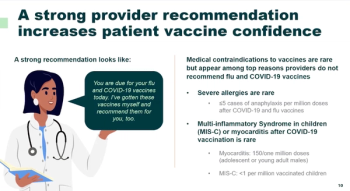
Could a probiotic help prevent the flu?
Researchers have found that the microbiome in the respiratory tract contributes to how susceptible we each are to the flu. Work is underway to use this data to create a preventive tool
Researchers have been making strides on harnessing the body’s own immune system to fight a variety of diseases. Now, researchers at the University of Michigan believe they can use the microbiome of the respiratory system to create a preventive treatment for influenza.
While vaccines are effective in protecting against some strains of the flu, not everyone is compliant with getting a flu shot, so the University of Michigan research team set out to find a cost-effective and easy way to reduce influenza risk.
The flu virus targets cells in the upper and lower respiratory tracts-an area of the body already laden with bacteria from our own microbiome. Now a study,
Previous studies have demonstrated changes in the microbiome in the nose and throat after infection of the flu virus, but there has been no association to date between the human nose/throat microbiome and influenza risk specifically.
To study this further, the research team used data from the Nicaraguan Household Transmission Study, where healthy individuals living in a household with someone infected with flu were tracked for 13 days or until they developed the flu themselves. The study involved a total of 537 individuals, and samples were taken of the bacteria in their nose and throat at the onset of the study. The bacteria found in the microbiome of these individuals was studied and categorized into five clusters, and found that certain cluster groups were at lower risk for contracting the flu. This discovery, the research team notes, may explain why some individuals are naturally more susceptible to flu that others. Translating this discovery into an intervention is the next step, but there is a long road ahead.
The research team hopes to use the data collected in this study can be used to find possible clinical and public health applications, perhaps in the form of a preventive treatment-like a probiotic-that would tailor an individual’s bacterial response to certain viruses.
Betsy Foxman, PhD, professor of epidemiology and director of the Center for Molecular and Clinical Epidemiology of Infectious Diseases at the University of Michigan, co-authored the study. She said that while clinical applications of this research are not yet clear, it does confirm that the bacterial composition of the respiratory tract does play a role in determining the risk of acquiring influenza.
“In the future, we may be able manage the nose/throat microbiome to help prevent acquiring influenza and other respiratory viruses and decrease risk of associated secondary bacterial infections-particularly otitis media and pneumonia,” Foxman said. “This would help preserve antibiotics, slowing the emergence of antibiotic resistance.”
Foxman said the research team will continue to study the respiratory microbiome to determine if there are specific compositions that are particularly effective in preventing the risk of acquiring certain influenza types.
Newsletter
Stay informed and empowered with Medical Economics enewsletter, delivering expert insights, financial strategies, practice management tips and technology trends — tailored for today’s physicians.






